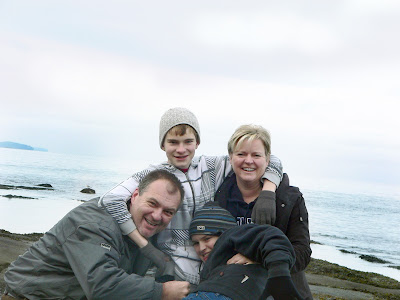
In recognition of Montessori Week, we asked our two high- school age boys what they considered memorable from their Montessori education. Without much hesitation they both said the math materials — in particular the Golden Bead Material and the Binomial and Trinomial Cubes. Concrete, hands-on materials for learning abstract concepts — wasn't Dr. Montessori a genius?
In reflecting on our reasons for pursuing a Montessori education for our children, especially beyond the preschool/kindergarten years, the Montessori hands-on materials were certainly a large factor. More so, and what we came to preach to our peers, was the physical movement that a Montessori classroom offered our boys. No long rows of desks to sit at all day, but rather options to work sitting at a table, standing at an easel, or lying on the floor with a mat.
Celebrating Montessori Week - Montessori for Our Family
Additionally, we valued the opportunity for our children to be participants in their own learning and to choose and repeat, repeat, repeat work that engrossed and captured them. We also appreciated that every activity, even simple lessons such as unrolling a mat, incorporated both the direct aim of the actual activity (unrolling a mat) and indirect aims (hand-eye coordination; motor skill development) that the boys did not even know they were learning!

We first came to Montessori with misconceptions of “work” and how discipline was used to maintain the peaceful, yet busy workplace. What we soon learned was that the method, the Montessori trained teacher, and the Montessori didactic materials all worked together to guide and channel the children’s energy from potential chaos and boredom into a state of focused, enthusiastic learning.
Initially, we started with a traditional approach to schooling. Before our eldest son began kindergarten in a traditional school, he was an enthusiastic child full of wonder. However, it was a different child that we picked up at day’s end — a child who seemed fearful and had tears in his eyes. After one month of this failed experiment, we were told to “come back next year.” We knew we needed to search out other options. Luckily, that is when we learned of Montessori. We were impressed with what the Directress shared with us and can truly say that from the very first day in the Montessori setting, our boy was transformed. We did not make the same mistake with our second son! We only wished we were familiar with Montessori from birth and knew we had to continue with Montessori right through the elementary grades.

As we grew to be more involved with Montessori, including working in a Montessori school and now here at North American Montessori Center, I find that we are continually in awe of the work that Dr. Montessori envisioned and put into practice. We are always learning something new about her method, such as the benefits of Montessori for seniors living with Alzheimer’s disease and for children with disabilities.
Although we do not have a Montessori high school available to us, we still find the Montessori method alive and well in our home. Much analysis, discussion, and a critical thinking approach occur with our boys’ high-school studies — not simply the completion of assignments. They are excelling at learning with a thoughtful and creative approach, thanks to the foundation they received in Montessori.
As much as possible, NAMC’s web blog reflects the Montessori curriculum as provided in its teacher training programs. We realize and respect that Montessori schools are unique and may vary their schedules and offerings in accordance with the needs of their individual communities. We hope that our readers will find our articles useful and inspiring as a contribution to the global Montessori community.
© North American Montessori Center - originally posted in its entirety at Montessori Teacher Training on Thursday, February 28, 2013.
© North American Montessori Center - originally posted in its entirety at Montessori Teacher Training on Thursday, February 28, 2013.

I'm a mom of four children, three of which are special needs: 2 boys ages 6 & 4 with autism and a 3 year old adopted daughter with Reactive Attachment Disorder and Fetal Alcohol Syndrome. Last year the boys attended a special needs preschool. By January the boys were not doing well AT ALL. My husband and I decided to start home schooling them. Over the course of the first year, we tried many methods. I searched the internet daily for ways to teach them. Repeatedly I came back to the same blog for ideas. It turns out it was a Montessori blog. From there I decided to look into the method. I read for months as many books as I could from the library and then decided to put together what I could. It's now been two months of Montessori Home School and it has been FABULOUS! The materials used are perfect for my autistic boys and I can't say enough about the practical life and sensorial activities that help them with their fine motor skills and sensory issues. And my daughter... the fact that she can choose her work, takes so many battles out of our day. I can't wait to learn more! We have our own home school blog http://everystarisdifferent.blogspot.com. I don't have "official" materials yet, but they're coming. I can't wait!
ReplyDeleteThank you for sharing your story with us! We are so glad that Montessori is working for you and your family. As you likely know, Dr. Montessori developed her method based in part on her work with children with special needs. Most importantly, Dr. Montessori developed a methodology that works for the individual child’s needs — regardless of abilities or challenges. How wonderful that despite your children’s diverse needs, they are all benefitting from learning with the Montessori method.
ReplyDeleteThank you also for sharing your blog with us. We will keep reading! And if you have any questions that we may help you with, please feel free to contact us at info@montessoritraining.net